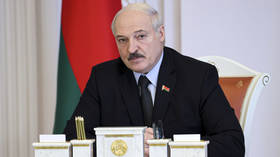Lukashenko ‘fan shop’ opens in Minsk
A pop-up shop selling merchandise bearing quotes by embattled Belarusian leader Alexander Lukashenko has opened its doors in Minsk. The somewhat unlikely concept follows mass protests in 2020 after a disputed election.
The launch of the boutique was captured on video last weekend by a Telegram channel run by self-described fans of the strongman, who has ruled the Eastern European nation since 1994. The footage seemed to show customers streaming into the outfitters, eager to get their hands on its wares.
The shop, named Perviy (‘First’), in a reference to Lukashenko’s status as the country’s inaugural post-independence leader, sells an array of hoodies and T-shirts emblazoned with a range of the president’s most memorable sayings, including one bearing the slogan “One does not become a president – one is born a president.”
According to state-run media outlet Belta, Lukashenko was sent a set of T-shirts printed with his quotes as a birthday present earlier this year. Inspired by this initiative, Perviy set out to launch its own merch line.
In a follow-up post, the Pool of the First Telegram channel reassured those who had not yet managed to get hold of the garments that there were plenty left: “If you didn’t make it to the opening, don’t feel bad. There will be enough merch for everyone. And if there isn’t, more will be made in no time.”
Lukashenko has been accused by Western nations of engaging in a brutal crackdown against opposition figures and the Belarusian public in the wake of last summer’s disputed presidential election, which international observers say was rigged in his favor. Tens of thousands of people took to the streets across the country to call for a fresh vote, in protests that were violently shut down by riot police and that led to a spate of arrests. Several protesters are reported to have died, and most opposition figures are now either detained or living abroad.
Last week, a court in the southeastern city of Gomel sentenced Sergey Tikhanovsky, a political activist and the husband of leading opposition figure Svetlana Tikhanovskaya, to 18 years behind bars for having organized what prosecutors described as “riots.” Three other members of the opposition were also found guilty in the same trial. Tikhanovskaya, who ran for president after her husband was detained, insists she was the real victor in last summer’s election. She has subsequently embarked on a tour of Western capitals, demanding sanctions be imposed on Lukashenko’s government and Belarus’ key industries.
The EU has refused to recognize the legitimacy of the vote, dubbing it as neither free nor fair, and later imposed restrictive measures against individuals “identified as responsible for [the] repression and intimidation against peaceful demonstrators, opposition members and journalists … as well as for misconduct of the electoral process.”
Brussels now insists Lukashenko is masterminding a worsening refugee crisis on the bloc’s borders with Belarus. Neighboring nations Poland and Lithuania have begun building colossal fences on their shared frontiers in response to a sharp rise in migrants attempting to cross over illegally, with most originating from the Middle East. The EU accuses Belarus of putting on flights from troubled countries such as Syria and Iraq, before bussing desperate people to the border and forcing them to attempt to breach the fence. Warsaw has deployed thousands of soldiers and responded with tear gas and water cannons.
Lukashenko has dismissed accusations that the row is part of a campaign of “hybrid warfare,” arguing that his government is no longer able to prevent the waves of people attempting to cross over due to the effect of sanctions imposed on the state by the bloc. However, in an interview last month, the long-time leader acknowledged it was possible that some of his officials were helping refugees enter Poland illegally, but insisted that this did not warrant an investigation. He accuses the West of engaging in a “hybrid war” of its own by hosting exiled opposition figures and media outlets banned in Belarus.






Comments are closed.